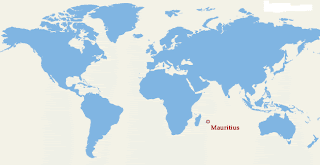EVER HEARD OF MAURITIUS?
WHERE IS IT ON THE WORLD MAP?
Mauritius is an island nation in the Indian Ocean about 2,000 kilometres off the southeast coast of the African continent. The country includes the islands of Mauritius, Rodrigues, 560 kilometres (350 mi) east of the principal island, the islands of Agaléga and Saint Brandon.
Mauritius is an island nation in the Indian Ocean about 2,000 kilometres off the southeast coast of the African continent. The country includes the islands of Mauritius, Rodrigues, 560 kilometres (350 mi) east of the principal island, the islands of Agaléga and Saint Brandon.
POPULATION
The
population of the Island currently stand around 1,290,000 inhabitants
The
various population movements of the 18th, 19th and early 20th centuries have
made of Mauritius a unique blend of different races, cultures and religions.
People of European, African, Indian and Chinese origins have created a
multiracial society where the various cultures and traditions flourish in peace
and harmony.
The island a safe place
to live, Mauritians being naturally well-inclined and of a peaceful nature. All
Mauritians enjoy freedom of expression and of religion.
CULTURE
Mauritius has a
cosmopolitan culture. Co-existence among Mauritians of Indian, African,
European and Chinese ancestry has led to a sharing of cultures and values, a
collective participation in festivals and increased understanding between
people of different backgrounds. Mauritius is today a unique melting pot of peoples,
languages and cultures.
 |
| Different Cultures of the Island. |
The main festivals and
religious events celebrated in Mauritius are Cavadee, Chinese Spring Festival,
Christmas, Divali, Easter, Eid-ul-Fitr, Ganesh Chathurti, Holi,
MahaShivaratree, Père Laval Pilgrimage and Ugadi.
LITERACY
The Country has the
highest adult literacy rate for the whole of Africa mainly as a result of free
education at primary and secondary school level. This highly disciplined and
educated workforce is also equally fluent in English and French, while many also
speak a third international language: Hindi, Mandarin, Urdu and a host of
European languages
GOVERNMENT
Mauritius is
internationally recognised for its continuity of government and rule of law.
The island has enjoyed enduring political stability ever since independence in
1968 with a democratically-elected government every 5 years.
WORKFORCE
The workforce is young,
29.2% being aged less than 30 and business spirited, innovative thinking and
open to the world. Mauritius has a talented pool of multidisciplinary
professionals trained locally and in the best universities around the world.
ECONOMY
With the right policies
at the right time in its economic history, Mauritius is nowadays categorised as
an upper-middle income country with a per capita income of USD 7,500. Over the
last four decades, the island has recorded a healthy and sustained average GDP
growth rate of 5%.
From a monocrop economy,
based on cultivation of sugarcane, the island has successfully transformed
itself into a robust, diversified and innovation-driven economy resting on
agro-industry, export-oriented manufacturing, tourism, financial services,
property development& real estate, ICT-BPO, Freeport & logistics and
seafood. Niche opportunities are cropping up in local emerging sectors such as
healthcare, life sciences, knowledge, renewable energies, creative industries,
marinas and film making.
EASE OF DOING BUSINESS
The business environment
and the investment climate in Mauritius are constantly being enhanced with a
view to strengthen the image of Mauritius as an attractive investment
destination. The sound economic policy and good governance have made Mauritius
the most business friendly destination in Africa. According to the latest World
Bank Doing Business Survey, Mauritius is the No.1 in Africa and 23rd globally
in terms of ease of doing business. Canadian Fraser Institute also ranked
Mauritius 1st in Africa and 9th worldwide on its chart of economic freedom
Today, any foreign
investor can set up hassle-free in Mauritius and be operational in just 3
working days. Mauritius offers a business environment which is very conducive
to business growth and investment: a low tax regime is in place where personal
and corporate tax are harmonized at a low 15%, dividends are tax free, there is
no exchange control and export-oriented operators enjoy duty-free privilege for
their inputs and equipment.
MAURITIUS AS A FINANCIAL
CENTRE
Over the years, Mauritius
has built its reputation as a safe, trusted and secure jurisdiction. Today the
Mauritius financial platform is recognized by international institutions like
the OECD, IAIS, IOSCO, FATF and the IFSB. Financial Services remains one of the
most important contributors to the Mauritian economy, representing 13% of GDP
and directly employing over 15,000 highly skilled professionals. The sector
comprises of major local and international players in banking, insurance,
capital markets, fund administration and management, international legal
services and investment advisory amongst others.
So far, Mauritius has
signed Double Taxation Avoidance Agreements (DTAAs) with 39 countries and
Investment Promotion and Protection Agreements (IPPAs) agreements with 36.
In addition, Mauritius
has secured preferential market access to the European Union, the USA through
the Africa Growth and Opportunity Act, the Common Market for Eastern and
Southern Africa (COMESA) and the Southern African Development Community (SADC).
To facilitate business and commercial activities, Mauritius has a well-developed infrastructural network comprising of an extensive and well maintained road infrastructure, a modern and efficient port capable of berthing vessels up to 100 metres, direct air connections with several cities around the world; high bandwidth fibre cable connectivity and a reliable fixed and mobile telephone network.
To facilitate business and commercial activities, Mauritius has a well-developed infrastructural network comprising of an extensive and well maintained road infrastructure, a modern and efficient port capable of berthing vessels up to 100 metres, direct air connections with several cities around the world; high bandwidth fibre cable connectivity and a reliable fixed and mobile telephone network.
The Government has
ensured that doing business in and from Mauritius is both easy and smooth and
complies with best practices in terms of transparency, good governance and
ethics.

No comments:
Post a Comment